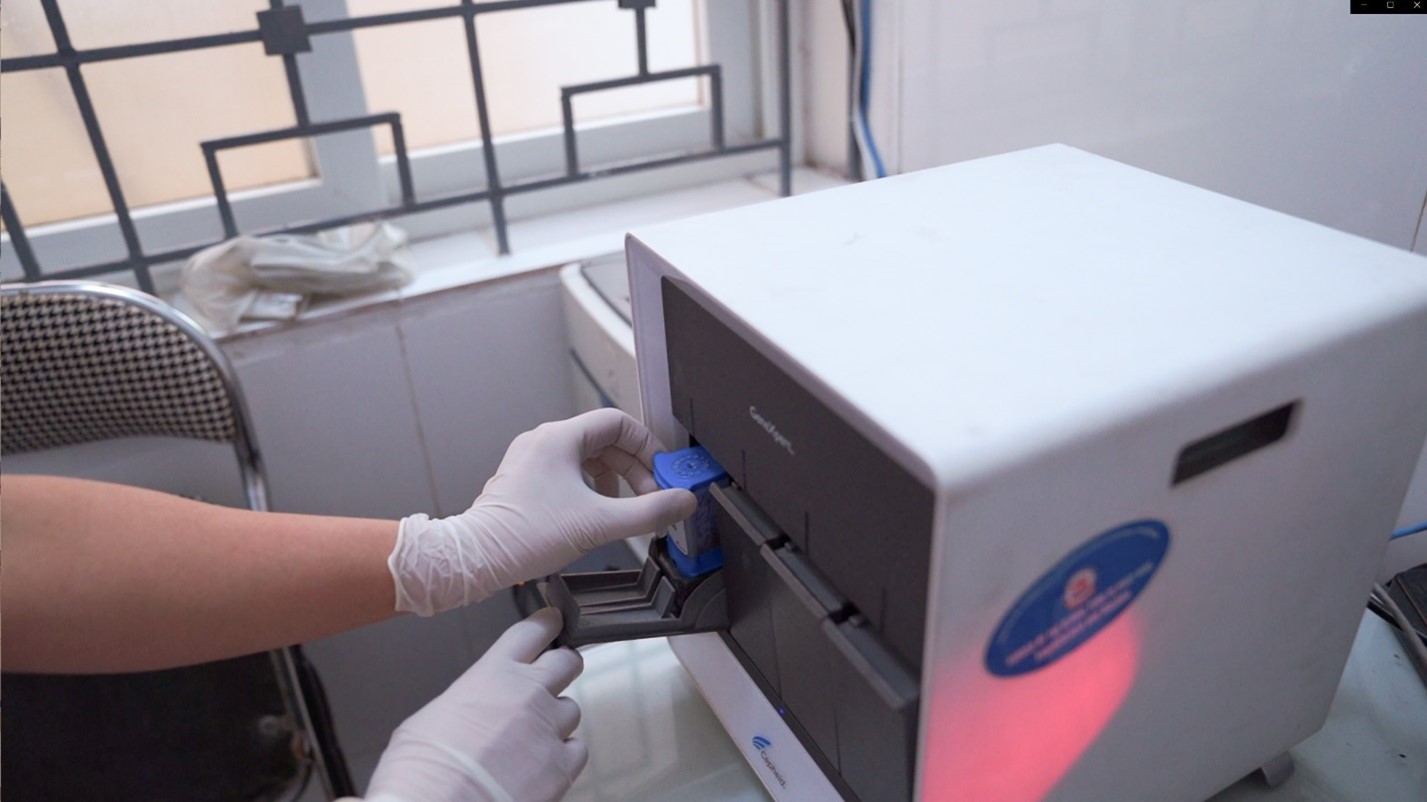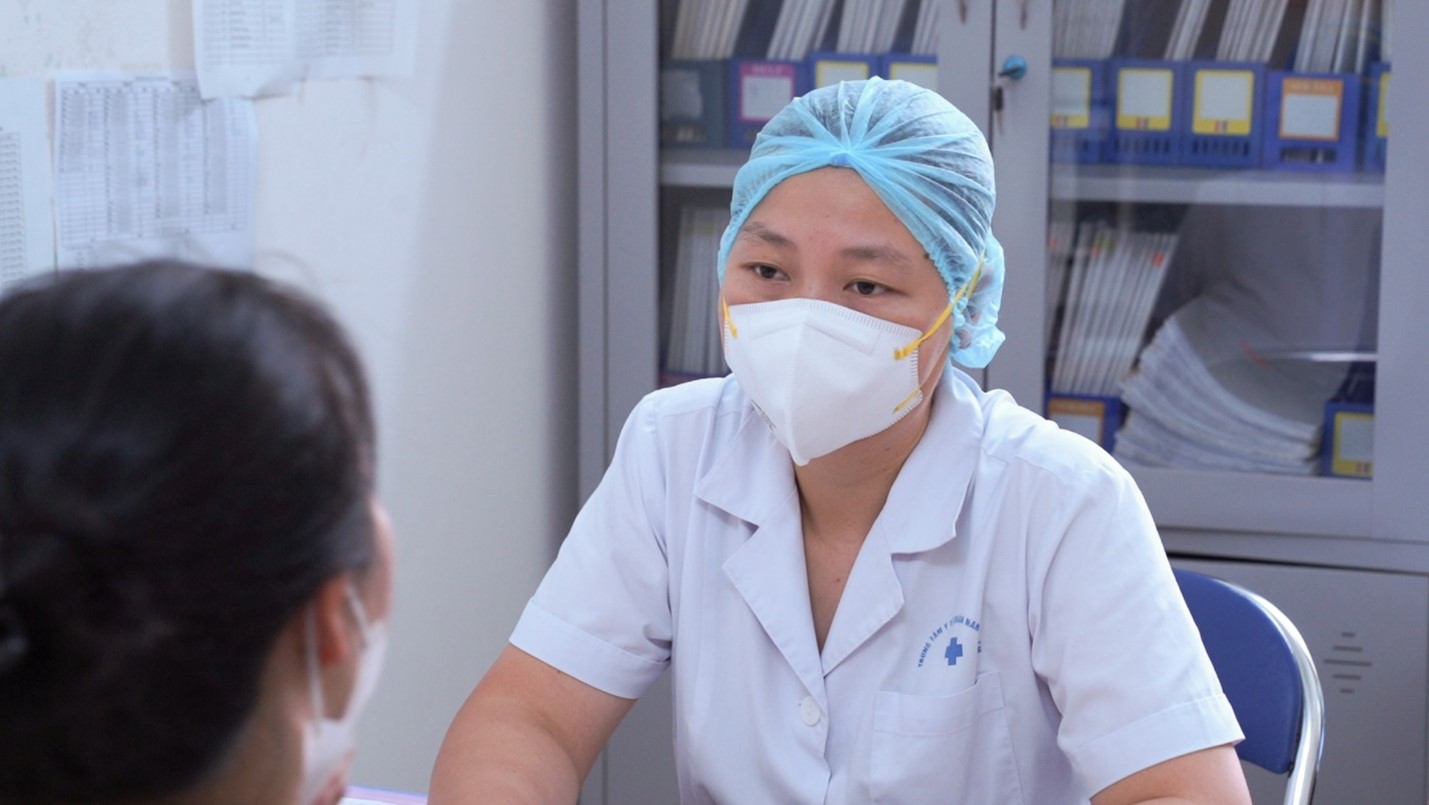With WHO and the Global Fund support, a pilot programme in Viet Nam is using innovative technology to improve access to faster hepatitis C diagnosis and treatment.

From despair to hope: For ten years, Dam The Hanh believed he would never recover from hepatitis C. Photo credit: WHO Viet Nam/ Thuy Trang
When Dam The Hanh tested positive for hepatitis C in 2014, he could not afford the treatment.
"I learned how the disease can turn into cancer very quickly,” says Mr Hanh, now 45. “I thought, it’s just a matter of time before I die, so I gave up.”
Ten years later, he is taking part in a Ministry of Health pilot programme, supported by the World Health Organization (WHO), to make fast hepatitis C testing and treatment available at district health centres.
La Thi Tuoi, 42, is also in the programme. She sought care when her health deteriorated.
“I couldn’t sleep, I was always sleepy but could not sleep. I was never hungry, never full, but bloated when I ate," Ms Tuoi said.
At Nam Tu Liem District Health Centre in Ha Noi, health care workers fed a sample of Ms Tuoi’s blood into a point of care testing machine. Within 60 minutes, the hepatitis C virus had been detected. That same day, she received the first month of a three-month course of medication.

Time for action: La Thi Tuoi, 42, urges people to seek care if they think they might have the virus. Photo credit: WHO Viet Nam/ Thuy Trang
Hepatitis C is spread through contact with infected blood or sexual intercourse. This can happen through sharing needles or syringes, or from unsafe medical procedures such as blood transfusions with unscreened blood products or unsafe sex. Viral hepatitis causes inflammation of the liver, which can lead to cirrhosis, liver cancer, and liver failure, the latter often resulting in death.
Viet Nam has the fifth highest liver cancer incidence and death rate in the world and approximately 8 million people, or 1 in 12 people, have hepatitis B, C or both.
However, around 90% of people with hepatitis C globally, are unaware they carry the virus – and are therefore undiagnosed and not on the medication needed to cure it.
There are several barriers to diagnostic testing and treatment. These include; until now, diagnostic testing has only been carried out at provincial and national hospitals, people might not have symptoms or understand the need to be tested and there are often long waiting times for test results. In addition, the cost of treatment can be four times the average monthly income, so many people who have hepatitis C are not being treated.
Since 2023, Nam Tu Liem District Health Centre in Ha Noi and Thot Not District Hospital in Can Tho Province have removed these barriers by using a point of care molecular testing machines, which were previously only used to diagnose tuberculosis (TB). With WHO and Ministry of Health support, staff are now using the technology to measure levels of hepatitis C virus (the viral load) in patient blood, with testing and treatment free of charge.
Point of care testing also allows for same-day diagnosis and treatment, which helps reduce the risk of an infected person transmitting the virus to others, experiencing complications from infection, or being lost in the system between testing and notification of test results.

Blood testing for hepatitis C viral load at Nam Tu Liem District Health Center. Photo credit: WHO Viet Nam/ Thuy Trang
WHO supported the design and implementation of the programme, in collaboration with the Viet Nam Administration for the Control of HIV/AIDS (VAAC), and the National Tuberculosis Control Programme and with medicines provided by the Global Fund.
In the first year, Nam Tu Liem District Health Centre diagnosed 371 people with hepatitis C, with almost 98% of people going on to receive treatment. So far, more than 100 people have completed their treatment, and 99% of them are now cured.
As the pilot has demonstrated that hepatitis C can be successfully diagnosed and treated at district health facilities, closer to where people live, it will be expanded to more provinces in 2025 with support from the Global Fund.
Also in late 2024, the two health facilities in the pilot will start offering viral load testing for HIV, using the same machines, meaning people living with HIV will also benefit.
WHO Viet Nam Representative Dr Angela Pratt said accessibility makes a real difference to both people in need and also the broader health care system.
“Bringing diagnostic testing closer to where people live has the potential to dramatically increase the number of people in Viet Nam being tested and cured for hepatitis C. Expanding access to hepatitis services will reduce the burden to individuals, the community, health system and the economy.
“Ideally, the costs will be covered by social health insurance in the future so more people can benefit from this essential service.
“We hope the results of this pilot programme will bring Viet Nam closer to its goal of eliminating the viral hepatitis epidemic by 2030.”
VAAC Director General Dr Phan Thi Thu Huong said point of care testing not only brings health gains, but is also an efficient way to use health care resources.
“Using existing point of care machines to test for several diseases makes sense for both health care facilities and patients. This is a great example of how integrated care and strengthened primary health care can improve access to TB, hepatitis C and HIV care.”

Improving access: Health care worker Mai Thi Bich Hong, said the programme was already helping more people access care. Photo credit: WHO Viet Nam/ Thuy Trang
Ms Mai Thi Bich Hong, who is part of the team implementing the pilot at Nam Tu Liem District Health Centre, said it was already making a huge difference for patients.
"When we health care workers just try a little harder, the patients benefit greatly. More people having early access to treatment and staying healthy means less burden for the whole society.”
The pilot programme is due to run until the end of June 2025, with initial results encouraging.
Mr Hanh said he felt lucky to take part in the programme.
"I made progress, I feel a lot healthier, gaining about 3-4kg. It’s greatly beneficial, I don't have to worry about the disease progressing. It reduces my worries so I can work and have peace of mind."
Ms Tuoi was also relieved to feel heathier.
“After taking medicine for a month, I saw an improvement, my work and everything returned to normal. By the third month, I felt like I was no longer sick.”
The theme for 2024 World Hepatitis Day on 28 July is “It’s time for action”.
When asked if she had any message for others on the day, Ms Tuoi urged people to take action.
"If anyone has similar symptoms, do not buy medicine yourself, visit the health centre for advice first.”
